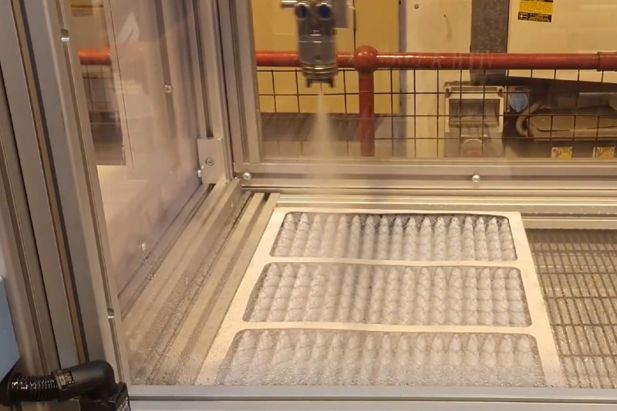In a study, published today (9 March 2022) in the journal Scientific Reports, the antimicrobial treatment for air filters – coated with a chemical biocide called chlorhexidine digluconate (CHDG) – were rigorously tested and compared to commonly used standard ‘control’ filters in the laboratory, in industrial air condensing units, and in a trial on-board trains operating on the UK’s railways.
In the laboratory, cells of the Wuhan strain of SARS-CoV-2 – the virus that causes Covid-19 – were added to the surface of both the treated and control filters and measured at intervals over a period of more than an hour. The results showed that, while much of the virus remained on the surface of the control filter for an hour, all SARS-CoV-2 cells were killed within 60 seconds on the treated filter.
Meanwhile, in order to determine how effective the filters are in a real-world setting, both the control and treated filters were installed in heating, ventilation and air conditioning systems on train carriages. The filters were installed for three months in matched pairs across carriages on the same train-line, before being removed and shipped for analysis with researchers counting colonies of bacteria remaining on them. The trial found no pathogens survived on the treated filter, even after three months on-board the train.
” The Covid-19 pandemic has brought to the forefront of public consciousness the real need for new ways to control the spread of airborne respiratory pathogens,” Dr. Felicity de Cogan, Royal Academy of Engineering Industry Fellow at the University of Birmingham, stated.
In crowded spaces, from offices to large indoor venues, shopping malls, and on public transport, there is an incredibly high potential for transmission of Covid-19 and other viruses such as flu, she recalled.
We are excited that we have been able to develop a filter treatment which can kill bacteria, fungi and viruses – including SARS-CoV-2 – in seconds. This addresses a global un-met need and could help clean the air in enclosed spaces, helping to prevent the spread of respiratory disease.
mh/pll/jha/znc









